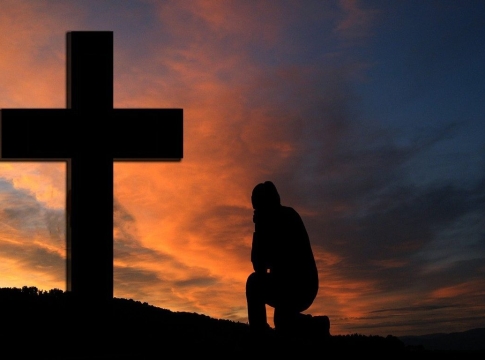
The Latin translation of John 1:14, “The Word became flesh,” is where the word “incarnation” originates. The Son of God entered the earth in the form of a man; this is not to say that a man miraculously became God. 100% human and 100% divine (Colossians 2:9; Philippians 2:5-8).
Throughout his earthly ministry, Jesus demonstrated both of his natures: he received [praise that only God deserves] and performed actions that are only capable of God, including reading people’s thoughts and pardoning sins. According to Mark 15:37–39, Jesus likewise went through [real human experiences], including growing up, experiencing hunger and thirst, and even dying.
God’s plan
Though it may seem unbelievable that God would become a man and even die, this was all part of [God’s everlasting plan]. From the beginning of the Bible, God always intended for man to rule over creation (Genesis 1:26; Psalm 8:3-9). However, as the first man, Adam, found out, great power also carries enormous responsibility. The curse and the divine death sentence were brought into the world by [Adam’s sin] (Genesis 2:17, Genesis 3:17–20; Romans 5:12).
But God didn’t give up on His plan. God said that after Adam believed the lies of the devil, another man would be born who would defeat the devil (Genesis 3:15). Every nation on earth would be blessed via this guy, who was descended from Abraham through the tribe of Judah and the line of King David (2 Samuel 7:12–13). And yet, this man would be magnificent as well.
Prophets are foretelling the Messiah
According to Isaiah 7:14 and Isaiah 9:6-7, Isaiah predicted that the “Mighty God” would establish His own kingdom on David’s throne and announce the virgin birth of “Emmanuel”—”God with us.” The prophet Daniel also predicted the arrival of “one like a son of man,” who would have all the rights and power of God Himself, rule forever, and be worshipped by all peoples (Daniel 7:13–14). Jesus Christ is the long-awaited divine-human ruler of the entire creation (Ephesians 1:9–10).
Jesus is entirely God and fully man. He was born to the virgin Mary (Matthew 1:22-23, Galatians 4:4), and he is descended from Abraham, Judah, and David (Matthew 1:1-16; Romans 1:3). Knowing who He was, Jesus described Himself as the “Son of Man” that Daniel had prophesied many times. He received a death sentence for blasphemy because of this accusation (Mark 14:62–64). According to Revelation 13:8, Jesus’ crucifixion was not a dishonorable accident, but rather the culmination of God’s plan. According to 1 Timothy 1:15 and 1 John 4:10, Christ Jesus came into the world to rescue sinners, and the only way He could accomplish this was by dying in our place.
Death penalty
According to Romans 5:14–19 and 1 Corinthians 15:21–28, Jesus, the “second Adam,” assumed full responsibility for our death sentence as the new head of humanity and endured the just punishment we deserved (Hebrews 2:9). Therefore, we are able to obtain God’s promised benefit by placing our confidence in Jesus (Galatians 3:13–14). In a freed and flawless new creation, we might live as God’s redeemed children anticipating our family home (Romans 8:17–21; Revelation 21:1-4).
Because of how crucial the incarnation is to Christianity, Jesus instructed His disciples to commemorate it on a regular basis by partaking in the Lord’s Supper (Mark 14:22–24). The bread and wine serve as reminders that Jesus’ actual human body was broken for us on the cross (1 Corinthians 11:23–26) and that His blood was shed as a “ransom” for many people (Mark 10:45). Salvation would not be possible without the incarnation because, according to Hebrews 9:22 and Leviticus 17:11, “without the shedding of blood there is no forgiveness” of sins. God could not have shed blood if he had not been given a human body (Hebrews 10:5–10).
God doesn’t want to remain distant
God revealed Himself to us more fully than at any other time in history when He became man (John 1:17–18, John 14:9; Hebrews 1:1–3). According to Psalm 18:35, the incarnation shows that God is not only all-powerful but also genuinely humble and sympathetic toward us, going to tremendous lengths to make us wonderful. God made the decision to personally experience the suffering and loss of life and death in a damaged world, as opposed to remaining at a safe distance. Now that He knows our frailties, He can empathize with us (Hebrews 2:17–18, Hebrews 4:15). Because, according to 2 Corinthians 8:9, “though He was rich, yet for your sake He became poor, so that you through His poverty might become rich.”
The cost of our salvation
However, we might question why our salvation should come at such a steep cost—no less than the priceless blood of God Himself (Acts 20:28)? Furthermore, why would God be prepared to shell out that kind of money for us? In response to these inquiries, we are faced with the startling but joyful realization that, although we are more wicked than we ever imagined, we are also more loved than we ever could have imagined. This is the significance of Christ’s incarnation.
What does this explanation from the Bible say to you? Kindly leave your comments below!





